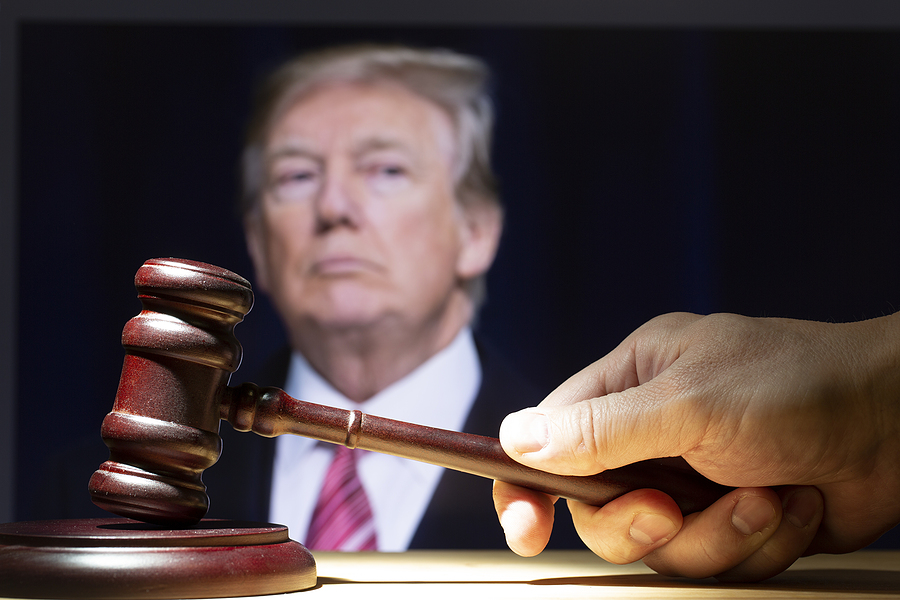
November 17, 2023

Source: Bigstock
I knew what to expect when I voted for Donald Trump. Although I never directly interfaced with him or any of the business entities he controls, as an attorney for the IRS I did handle cases of taxpayers who had dealings with Trump or one of his companies, and accordingly saw documents bearing his signature, and thus knew the type of shtick he is wont to pull. I would not wish to work for him, nor would I want him as a client. But I didn’t vote for Trump to be my boss or my client; I voted for him to be the CEO of the USA.
Donald Trump’s current New York civil legal proceeding show trial is being staged in the Supreme Court of New York County. (Don’t be too impressed with that label—in New York, the Supreme Court is the lowest tribunal of general jurisdiction; each county has one.) Trump is providing a busy livelihood for the journos and photographers covering the shit show.
But Donald isn’t the Fourth Estate’s only fodder supplier. Much newsprint ink is about the judge sitting on the bench, Arthur Engoron (whom Trump has labeled a “rogue judge”).
I know Artie. We were part of the same group admission to practice before the U.S. Supreme Court in 1996; in 2002 he brought me on as a panelist when he organized a training seminar for NYC Civil Court arbitrators; and I attended his robing ceremony after his election in 2003 to that court. His great acumen regarding the law and other matters is indisputable. This is not intended to be a hit piece; my personal biases toward him are quite positive. Whether he is or is not the appropriate adjudicator of the case now before him is a separate issue entirely.
Unlike judges in the regular federal courts, who serve lifetime appointments, New York State judges serve for limited terms (an oversimplification; the detailed exceptions are best suited for discourse elsewhere). Politics play into the robing of all judges, but judges in New York and other states need to play the political game even more avidly than the federal judges in order to be seated on the bench.
This is not necessarily a bad thing. Before Oct. 7, 2023, the country of Israel was rife with dissent and instability over the issue of judicial reform (an issue that, to be sure, was expropriated by certain political camps as an excuse for lawlessness in the streets, but I digress). Where, as in Israel, judicial appointments are effectively controlled by the judiciary itself, the judiciary eventually waxes arrogant and insolent, and fails at its job to promote law and order.
If not for the political processes, the American judiciary would have become a closed and exclusive old boys’ club. It is obvious that the presence on the Supreme Court bench of the likes of Harlan Fiske Stone (who staunchly opposed admitting women to Columbia Law School during his deanship there) and überbigot James McReynolds would have closed the court to many qualified and talented individuals had the partisan political processes not provided alternatives.
Similarly, it was politics and not an old boys’ club that placed Horace Stern on the Philadelphia Common Pleas Court bench, from which he advanced to become the first Jewish justice of the Pennsylvania Supreme Court in 1936 and ultimately to the Chief Justice’s chair in 1952. Others who received their robes via the political processes include but are not limited to Italian-American Michael Musmanno, Greek-American Thomas Lambros, and Chinese-Americans Denny Chin and Doris Ling-Cohan (I acknowledge with gratitude that Doris’ election to the NYC Civil Court bench gave me the teaching billet she had to vacate, thereby extending my teaching gig following the funding cutoff for the course I had previously taught).
In his zeal to effectuate justice, Artie has overstepped his bounds before, most notably in the Laurie Kellogg case, where Artie found that the Parole Board’s denial of parole was “irrationality bordering on impropriety” and ordered Laurie’s immediate release. The Appellate Division upheld Artie’s assessment of the Board’s actions but found that Artie had usurped the Board’s function and ordered the Board to conduct a new hearing (which resulted in Laurie’s release from prison). When I was a Contracting Officer for the Department of Defense I similarly got into trouble for thinking a few steps ahead of the bureaucracy.
Artie has been getting a bad rap of late for his statements in a 2015 video, in which he discusses the judicial “tool” of overriding a jury’s finding. Quite frankly, I agree with him on that score; the device of judgment non obstante veredicto enables a judge to correct a severely misguided jury verdict under rare and extreme circumstances.
Arthur Engoron, then, is a very valuable asset to the New York judicial system; certainly a better deal than some of the black-robed bench monkeys who are reckless in their personal conduct and/or are corrupt.
If I were a judge in any of the Trump litigation now underway I would not wish to preside over the last case standing as the government’s cases become increasingly unstable, but neither would I wish to be first to fold. Artie’s dilemma, then, may well be choosing between justice and political imperatives. I accordingly would not put it past Artie to intentionally utter a ruling that could not pass appellate scrutiny, so that he could then tell his party apparatchiks that he tried his best.
Artie is a political animal who, having played the blood-sport game of politics, is now reffing a playoff game in a full stadium; he knows what the stakes are. The players on the field are Donald Trump and Letitia James, each of whom can easily inflict collateral damage to bystanders. I hope, for the sake of the judiciary institution no less than Artie’s own, that the referee in this high-stakes game is not carried off from the field on a stretcher.